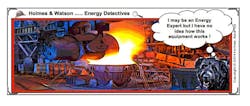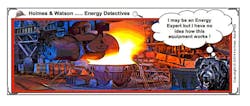What we learned about saving energy in our first industrial project - A foundry
Watson: How did you get interested in industrial plants and their energy systems, Holmes?
Holmes: After working in nearly every type of non-industrial facility for many years, we were approached by Golden Castings, a foundry looking for ways to save money. Copies of their utility bills showed that they were spending more than all of our other clients combined.
Watson: With foundries and other industrial plants spending so much money why had you avoided them?
Holmes: I assumed that most of an industrial plant’s utility dollars would be spent on complex production systems and their employees would have the specialized knowledge to keep them operating as efficiently as possible. Not having worked in industrial plants, we had almost no knowledge of industrial energy systems.
According to the conventional wisdom at the time (and still widely believed) we were told that “we couldn’t touch production”; the place where 90% of their energy dollars were being spent was off-limits.
Watson: Is that why so many energy experts focus on lighting?
Holmes: I imagine so. We thought all we were going to be able to do was recommend more efficient lights or to shut off the office air conditioning at night. But I thought what the hell. They are using a lot of energy and spending a lot of money; this could turn out to be interesting. We could learn something!
Watson: What did they tell you about the production systems when you initially met with them?
Holmes: Golden told us their largest user was a giant electric furnace, where they melted iron for engine blocks. That was a critical process and it could not be changed.
Watson: If you weren’t going to be able to change their biggest user, what did you do?
Holmes: We just followed the same process that had worked so well in our non-industrial projects; we installed a monitoring system and let the data expose the opportunities. We installed a number of panels around the plant tied to the main utility meters, transformers and all of the major systems and equipment.
Watson: You have taught me that basic problem solving requires keeping an open mind; basing decisions on fact. What did you learn from the actual monitored data?
Holmes: We learned that the electric melting furnace wasn’t the biggest user of electricity. That was a surprise to all involved. The biggest user of electricity was the compressed air system, a support system, not directly part of the casting process. And our data showed that more than 35% of the electricity the compressed air system was using was being wasted.
Watson: So their employees weren’t operating the largest energy systems as efficiently as possible as you had assumed. Why not?
Holmes: Before we installed the Energy Monitoring System they had no information on the energy consumption and efficiency associated with each process and system. They were focused on running the production systems to meet orders and produce high quality castings.
Watson: How did you get the employees involved with the energy efficiency aspect of production?
Holmes: We didn't; top management did. We were hired by Larry, the VP and he was serious about reducing energy costs. He and the President had several meetings with the employees and energy conservation was made a high priority for all. They are the ones who got the employees involved and they gave them a strong incentive.
Watson: What was your role?
Holmes: Larry assigned Scott to be the point man for Golden and he reported to Larry every day.
Our role was to train and support Scott. We provided Real-Time and Historical Information on the energy consumption and efficiency associated with processes and systems in an easy-to-understand format and pointed out opportunities that we saw. Scott took it from there, investigated the opportunities and made the required changes.
Watson: Did Scott have specialized computer training or experience managing energy?
Holmes: I don’t think Scott had finished high school but he was sharp. He had been in maintenance as long as he had worked there. Scott was the third generation of his family to have worked at Golden. He had never used a computer before but caught on fast. We put the PC in a basement office and trained him to use it. Our total training time for him on the monitoring system was about an hour.
Watson: How did he do?
Holmes: He was enthusiastic and took his new duty to heart. It was his plant and when he looked at the computer screens, he wasn’t just looking at numbers or graphs. He was seeing his plant and could see how much energy each piece of equipment was using every minute of every day.
That is a huge advantage an employee has over an outside consultant. While an energy professional will have specialized knowledge and training, he or she will have to learn about the plant and its equipment and that takes time. Employees are the experts in their plants.
Watson: Can you give me one example that sticks in your mind?
Holmes: I sure can. I have never forgotten one particular time when I was looking over his shoulder and he saw that Transformer #7 had a load that was approximately 250 KW higher than it should have been at that time of the day. He said, “Somebody left Baghouse #4 running. They were supposed to shut it down at 2:30!”
Watson: Once Scott had the information from the monitoring system, what did he do with it?
Holmes: He did what you would do in your own home where you know what appliances you have and you can walk around and look at them, turn them off and on and watch the effect on the meter.
He could relate the data to the facility, the equipment and systems, the processes and operation. He knew more about that foundry and all of the energy systems than any Energy Expert could ever know.
And don’t forget, he had a very strong incentive from top management, from the President of the company.
Watson: What were the results? How much did Golden save?
Holmes: By shutting off baghouse fans, air compressors and other large pieces equipment that were running when they should be off, repairing leaks and broken equipment, Scott and Larry and the other employees reduced their electric cost by 21% through no-cost, low-cost changes alone.
Watson: So the keys were for the top management to provide the incentive, you to provide the monitoring system and data and to train and support the employees. The employees were the ones who actually made the changes and saved the energy.
Holmes: Right. We have worked in Donut, Aluminum, Cement, Chemical, Meat Packing, Injection Molding, Heat Treat and many more types of industrial facilities. We are the Energy Experts but it would be impossible for us to know all of the details about all of the equipment in every plant. The Employees are the Experts in their plant.
Success is the result of each party understanding their role and working together toward the common goal of producing actual results, reducing energy consumption and costs.
Tell us about your experiences, both good and bad with energy professionals, what has worked and what hasn’t. Send us your comments, thoughts and suggestions on how to improve our profession so we can all continue to learn from each other. Thanks – Holmes & Watson.

